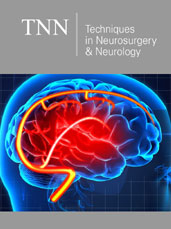- Submissions

Full Text
Techniques in Neurosurgery & Neurology
Psychological-Clinical Review on Coronavirus (COVID-19)
CMohammad Qassem Abdullah*
Clinical Psychology and Mental Health, Syria
*Corresponding author: Mohammad Qassem Abdullah, Clinical Psychology and Mental Health, Syria
Submission: March 31, 2021;Published: March 15, 2021

ISSN 2637-7748
Volume4 Issue1
Coronaviruses
Every person agree that health is very important and significant for human well-being.
Around the turn of the century, people primarily died from infectious disease and die from
lifestyle disease which are related to health damaging personal habits and behavior. Familiar
example includes heart disease, stroke, and lung cancer. Clearly some behaviors and lifestyle
promote health whereas other lead to illness and death. As the cartoon character Pogo put it
“we have met the enemy and he is us”, Now, the international healthy crisis is coronavirus, that
represent the most important challenge to the universal health care services. The infectious
disease is stressful event around the world that lead to many negative consequences and
effects: heath/medical, political, social, psychological fields. Coronaviruses (CoV) are a large
family of viruses that cause illness ranging from the common cold to more severe diseases
such as Middle East Respiratory Syndrome (MERS-CoV) and Severe Acute Respiratory
Syndrome (SARS-CoV). A respiratory virus that originated in China has infected more than
100,000 people and has begun to spread in the U.S. Coronavirus disease (COVID-19) is a
new strain that was discovered in 2019 and has not been previously identified in humans.
Coronaviruses are zoonotic, meaning they are transmitted between animals and people.
Detailed investigations found that SARS-CoV was transmitted from civet cats to humans and
MERS-CoV from dromedary camels to humans. Several known coronaviruses are circulating
in animals that have not yet infected humans. Common signs of infection include respiratory
symptoms, fever, cough, shortness of breath and breathing difficulties. In more severe cases,
infection can cause pneumonia, severe acute respiratory syndrome, kidney failure and even
death [1-3].
Standard recommendations to prevent infection spread include regular hand washing,
covering mouth and nose when coughing and sneezing, thoroughly cooking meat and eggs.
Avoid close contact with anyone showing symptoms of respiratory illness such as coughing
and sneezing. A novel respiratory virus that originated in Wuhan, China, has spread to over
100 countries in Asia, Europe, North America and the Middle East. More than 100,000 have
been infected, leaving many experts to fear a pandemic may already be underway.
a) China’s factory output posts sharpest plunge in three decades in Jan-Feb.
b) Unprecedented Federal Reserve move fails to calm markets.
c) Spain, France follows Italy in imposing severe restrictions on movement.
Previous headlines:
a. UNCTAD warns of a $1 trillion cost to the world economy.
b. Cryptocurrencies plunge.
c. Italy’s entire population under quarantine measures.
d. Some key industries in Wuhan are told they can resume work.
Coronavirus as universal crisis and stressful event
Coronavirus is currently, one the most important and globe adjustment disorder. Occur when ordinary life stresses push people beyond their ability to cope effectively. Some signs that a person may be suffering from an adjustment disorders are extreme irritability, sleep disturbances, loss of appetite, physical complaints, anxiety, and depression.
The psychological symptoms that related to coronavirus are more complex for many reasons:
a) Currently, there are no treatment for this disease.
b) It is infectious disease.
c) It is epidemic disease.
d) Rumor and propaganda have been taken places about this
disease.
e) Social and political policies have been focused and pay
more attention all over the world.
These characteristics represents some urgent issues relating to
this disease.
Questions and issues:
There are many hypotheses and issues relating to this universal
health crisis:
a) Can we speak about psychological and biological war?
b) What about the social media in this crisis?
c) Is this medical/health problem and crisis exaggerated by
rumor and propaganda?
d) What about the effectivity of the health services all over
the world?
e) Can we hypothesize: “coronavirus politics “?
Coronavirus is one of the most acute and chronic disease in the world. The most important symptoms that occur are: anxiety, and intense, sudden and unexpected panic. During the panic attack victim’s experiences heart palpitations or chest pain, choking or smothering sensations, feeling of unreality and feeling of losing control. Panic attacks may also occur in many anxiety disorders, but in coronavirus disease seem to appear without warning. The most important coping skills with this globe disease is Quarantine, but this behavior has many consequences on the personality adjustment and social relation and interaction and may lead to stresses and frustration. The defense mechanism can be appearing effectively everyday life activity (regression, projections, rationalization, reaction formations, avoidance, daydreaming). In sum, cognitive and behavioral approach for coping with crises is very significant for children, adolescents, adults and elderly stage. We should be optimistic and hopeful because distorted thinking cause people to magnify ordinary threats and failure, leading to distress and susceptible to decrease psychoneuro immunology of personality [3-5].
References
- Abdullah M (2020) Introduction to mental health. UK.
- Abdullah M (2017) Medical psychology. University of Aleppo, Syria.
- Pendleton (1998) Rumour research revisited and expanded. Language & Communication 1(18): 69-86.
- https://www.who.int/health-topics/coronavirus
- https://www.nhs.uk/conditions/coronavirus-covid-19/
© 2021 Mohammad Qassem Abdullah. This is an open access article distributed under the terms of the Creative Commons Attribution License , which permits unrestricted use, distribution, and build upon your work non-commercially.
 a Creative Commons Attribution 4.0 International License. Based on a work at www.crimsonpublishers.com.
Best viewed in
a Creative Commons Attribution 4.0 International License. Based on a work at www.crimsonpublishers.com.
Best viewed in 







.jpg)






























 Editorial Board Registrations
Editorial Board Registrations Submit your Article
Submit your Article Refer a Friend
Refer a Friend Advertise With Us
Advertise With Us
.jpg)






.jpg)














.bmp)
.jpg)
.png)
.jpg)










.jpg)






.png)

.png)



.png)






